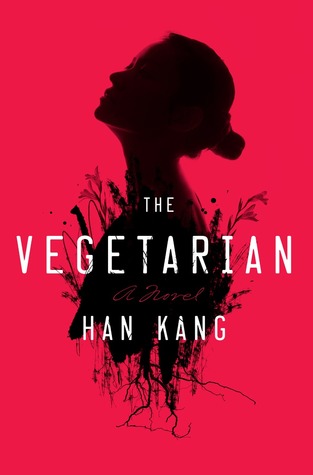Our book group choice for April 2016 is The Vegetarian by Han King. Before the nightmare, Yeong-hye and her husband lived an ordinary life. But when splintering, blood-soaked images start haunting her thoughts, Yeong-hye decides to purge her mind and renounce eating meat.
The Vegetarian is a novel by Han Kang, first published in South Korea in 2007. It tells the story of Yeong-hye, a young woman who suddenly decides to stop eating meat after a series of dreams involving images of animal slaughter. Her decision has a profound impact on her family and her own sense of self, leading her to question her place in the world and her relationship to violence.
The novel is divided into three parts, each narrated by a different character: Yeong-hye’s husband, her brother-in-law, and her sister. The first part, “The Vegetarian,” tells the story of Yeong-hye’s decision to become a vegetarian and its impact on her marriage. Her husband, Mr. K, is initially supportive of her decision, but he soon becomes frustrated by her refusal to eat meat or cook for him. He begins to see her as a burden and a source of shame, and their relationship begins to deteriorate.
The second part, “The Fruit of My Woman,” is narrated by Mr. K’s brother, In-hyeok, an artist. In-hyeok is fascinated by Yeong-hye’s transformation, and he begins to see her as a kind of muse. He paints her portrait, and he writes a short story about her based on her dreams. However, he also begins to feel increasingly disturbed by her behavior, which he sees as a sign of mental illness.
The third part, “The Vegetarian Who Married a Tree,” is narrated by Yeong-hye’s sister, In-hye. In-hye is initially concerned about Yeong-hye’s mental health, but she eventually comes to see her as a kind of saint. She believes that Yeong-hye is on a spiritual journey, and she supports her decision to become a vegetarian.
The Vegetarian is a complex and challenging novel that explores themes of violence, gender, and identity.
Here are some of the key themes of the novel:
- The violence of meat-eating: The novel’s opening scene is a graphic depiction of a pig being slaughtered. This scene is meant to shock the reader and to make them think about the violence that is inherent in the meat industry.
- The relationship between violence and gender: The novel suggests that violence is often directed at women, both physically and psychologically. Yeong-hye is repeatedly subjected to violence, both by her husband and by other men. This violence is a way of controlling her and of keeping her in her place.
- The nature of identity: The novel explores the question of what it means to be a woman. Yeong-hye’s decision to become a vegetarian is a way of rejecting the traditional role of women in Korean society. She is no longer willing to be a wife, a mother, or a cook. She is simply herself.
Discussion Questions for The Vegetarian
- What is the relationship between Yeong-hye, “the most ordinary woman in the world,” and her husband, Mr. Cheong. Why is her refusal to eat meat, so shocking to him?
- The novel is structured in a tryptic format, with each section narrated by a family member who reacts to and interacts with Yeong-hye. As the three narrators confront her deepening madness, each also comes face to face with his/her own desires. What do they each come to understand about themselves and what they want from life? In what way are they transformed?
- Talk about the way in which the author positions Yeong-Hye’s vegetarianism—as a feminist choice and revolt against patriarchy. Are there another way to look at it?
- The book is suffused with a mix of sex and violence. Do you find the physicality disturbing, shocking, repulsive, or something else? Why is there so much sex and brutality in this work; what might its purpose be?
- What are your feelings about vegetarianism? Do you know vegetarians, or are you yourself one? What are the reason for eschewing meat? Is it a matter health, morality, religion, or basic distaste? If you are a meat eater, do you sometimes feel like the dinner acquaintance in the novel, who comments: “I’d hate to share a meal with someone who considers eating meat repulsive, just because that’s how they themselves personally feel….don’t you agree?”
- Trace the stages of Yeong-hye’s state of mind. Talk about her thoughts and the language which reflects them—as the passages range from journal-like entries to disconnected, abstract, almost impressionistic images.
- The novel ends on an ambiguous note. What do you envision as the outcome? What do you think happens to Yeong-hye?
- What is this book about anyway?
Individual Ratings
DKB's Rating 




Catherine's Rating 




EmmaT's Rating 




Jo's Rating 





